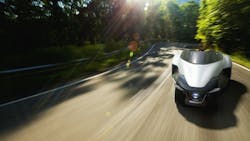Tokyo Motor Show Focuses on Eco-Friendly Cars
TOKYO - Eco-friendly cars were in the spotlight as the Tokyo Motor Show opened Wednesday, with Toyota (IW 1000/8) unveiling a new model and Nissan (IW 1000/31) touting its aerodynamic BladeGlider for energy-conscious drivers.
Toyota, a pioneer of hybrid vehicles, rolled out its FCV concept car, a four-seater sedan that has a range of 500 kilometres (310 miles) -- longer than previous versions -- and whose fuel cells can be recharged in just three minutes through hydrogen gas tanks stored inside.
The car, expected to go on commercial sale in about two years, seeks to jump key hurdles that have hindered consumer buying of eco-friendly vehicles such as limited range and refueling infrastructure.
Relatively high prices and restricted model choices have also hurt demand despite automakers' big hopes for the sector.
But purchases of low-emission vehicles are forecast to grow due to increasingly strict emissions standards.
"Reducing energy consumption is the key for automobiles to survive," said Osamu Honda, executive vice president of Suzuki (IW 1000/156).
"The demand for less fuel consumption is getting stronger and stronger."
Toyota, the world's biggest automaker, also showcased its futuristic scooter-like FV2 which allows standing drivers to change direction simply by shifting their weight. It is similar to the Segway although it can move at faster speeds.
The concept vehicle's pop-up windshield can turn oncoming objects a distinct color to alert drivers to their presence.
A Car People Neither Love Nor Hate
Despite the show's focus on eco-friendly vehicles, Toyota executive vice president Mitsuhisa Kato said automakers must still make vehicles that consumers want to buy.
"We don't want a car that people neither love nor hate," he told reporters.
"We want to make cars that people fall madly in love with, cars that convince them they could never drive anything else."
The world's leading automakers have long been eyeing a big-selling green vehicle, including Honda (IW 1000/29) -- which already has a fuel-cell car, the FCX Clarity, available on a small scale in a limited number of markets.
Rival Nissan on Wednesday showed off its BladeGlider, an electric concept three-seater vehicle that is meant to give drivers a sense of piloting an airborne glider. The sleek, futuristic styling is squarely aimed at drivers who still want performance and styling in an environmentally-friendly car.
But Nissan's target for sales of its commercially available Leaf electric vehicle are way below the predictions of chief executive Carlos Ghosn, who said Wednesday he remains hopeful especially if governments follow through on pledges to boost re-charging infrastructure.
"Electric cars is one of the pillars -- not the only one -- but one pillar of our technological development," Ghosn said.
"We continue to believe that it will be a major component of the car industry."
Nissan is also working on fuel-cell cars, but Ghosn said he was "frankly amazed" that rival automakers including Toyota see widespread commercial sales in the not-too-distant future given the lack of re-fueling stations for hydrogen tanks.
"It's very easy to have a prototype, but the challenge is the mass market," Ghosn said.
Fuel cell vehicles are considered the holy grail of green cars because they emit nothing but water vapor from the tailpipe and can operate on renewable hydrogen gas.
A Foreign Fight
The exhibition's 43rd edition, which runs until Dec. 1, features 177 exhibitors, including parts suppliers from a dozen countries.
But major U.S. automakers, including General Motors (IW 500/5) and Ford (IW 500/8), which have not attended since before the global financial crisis, are again staying away as are South Korean producers, with the exception of Hyundai.
The big European automakers will be looking to boost their presence in the world's third-largest car market after China and the United States.
However, foreign brands hold a miniscule share -- just 4.5% -- of a market that saw more than 5.0 million vehicles sold in Japan last year.
That puny presence has long fueled anger among U.S. and some European automakers, which say they have been effectively shut out of Japan through tariffs and other barriers.
The issue is an obstacle in ongoing free-trade negotiations.
Luxury German brands including Mercedes-Benz, BMW (IW 1000/37) and Porsche, which have achieved significant success in Japan, are among this year's attendees, along with Audi (IW 1000/61), Volkswagen (IW 1000/7), Renault (IW 1000/80), Peugeot-Citroen (IW 1000/55), Land Rover and Volvo (IW 1000/96).
Harumi Ozawa, AFP
Copyright Agence France-Presse, 2013
About the Author
Agence France-Presse
Copyright Agence France-Presse, 2002-2025. AFP text, photos, graphics and logos shall not be reproduced, published, broadcast, rewritten for broadcast or publication or redistributed directly or indirectly in any medium. AFP shall not be held liable for any delays, inaccuracies, errors or omissions in any AFP content, or for any actions taken in consequence.
